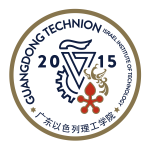Metabolic Engineering / Green manufacturing
Synthetic Biology / Bio-Intelligence and bio-computing
Feedback control theory / Biochemical reaction network
Bio-mathematical modeling / Microbiome interactions
Guangdong Technion - Israel Institute of Technology (GTIIT), China & Technion-Israel Institute of Technology, Israel.
The Chemical Engineering Program (Group of Peng Xu), Synthetic Biology and Intelligent Control Laboratory (SBIC-Lab, 合成生物智能控制课题组), is looking for 3-4 PhD/MS students to pursue their graduate study in:
- Metabolic Engineering / Green manufacturing
- Synthetic Biology / Bio-Intelligence and bio-computing
- Feedback control theory / Biochemical reaction network
- Bio-mathematical modeling / Microbiome interactions
合成生物智能控制课题组征招3-4 位硕士 / 博士生从事以下课题
- 代谢工程 / 绿色制造
- 合成生物学 / 生物智能与生物计算
- 反馈控制理论 / 生化反应网络
- 生物数学模型 / 微生物菌群互作
Contract duration: 2 years for MS, 3 + 1 years for PhD.
Guangdong Technion – Israel Institute of Technology (GTIIT) is a satellite university of Technion – Israel Institute of Technology, located in Shantou, China. Technion is world-renowned for its exceptional research and education. Since 2004, three faculty members in Technion received the Nobel prize, consistently ranked as a top-100 university (ARWU-Shanghai Ranking).
广东以色列理工学院是世界著名研究型大学以色列理工在汕头的分校,由李嘉诚基金会和广东省创建。所招的硕士、博士生学籍注册在以色列理工,有副导师 (以色列理工Technion教授) 共同指导。在以色列理工完成课业后回GTIIT完成课题研究,通过答辩后最终获得以色列理工的学位,所获得学位受教育部及国际认可。
Prof. Xu has interacted with international research teams and thought-leaders in the past 10 years to solve challenges in health, medicine, energy and environment. Professor Xu joined GTIIT, as an Associate professor of Guangdong-Technion Chemical Engineering program in Fall 2021. He was an Assistant Professor at the Department of Chemical, Biochemical and Environmental Engineering at University of Maryland Baltimore County from 2016 to 2020. He obtained his PhD in Chemical and Biological Engineering from Rensselaer Polytechnic Institute (2013) and completed his postdoc training in the Stephanopoulos lab at MIT (2016).
Dr. Xu has received a number of awards and recognitions, including the Chinese Government Award for Outstanding Self-Financed Students Abroad (2012), the Bill & Melinda Gates Foundation Award (2018), the Biotechnology & Bioengineering (B&B) Daniel IC Wang Award (2020), the Biochemical Engineering Journal Young Investigator Award (2021) and the NSFC Excellent Young Scientist Award (海外优青). He served in the editorial board for the journal Metabolic Engineering (IF = 9.7) and Current Opinion in Biotechnology (IF = 9.4), as the Associate editor for BioDesign Research. Professor Xu published more than 85 journal articles with a google scholar citation of 4440 and an H-index of 33, on world-leading journals including Nature Biotechnology, Nature Communications, Nature Chemical Biology, PNAS, Trends in Biotechnology, Metabolic Engineering, Biotechnology & Bioengineering, Current Opinion in Biotechnology and ACS Synthetic Biology et al.
The SBIC-Lab, led by Professor Peng Xu, focuses on applying chemical engineering analysis, control theory, molecular tools and computational models to decode biological intelligence, drive the convergence of synthetic biology and artificial design for green manufacturing, better health and medicine. The research team will focus on (1) Decoding biological intelligence for cellular design and computation; (2) Microbial metabolic engineering for manufacturing value-added compounds; (3) Understanding the interplay of antimicrobial resistance and gut microbiota; (4) Microbiome, natural products and precision medicine et al.
The research topics of the positions include:
- Chemical biology, molecular biology and genetic engineering;
- Feedback control theory, gene circuits and bio-intelligent design;
- Bio-computing based on biochemical reaction network;
- Yeast genome engineering and genome evolution;
- Natural product synthesis and human/animal gut health;
- C1 feedstock utilization.
Synthetic biology, Metabolic engineering, Intelligent control, Biocomputing, Natural Products, Human Microbiome, Biochemical reaction network, Molecular Biology, Microbiology, Medicine, Oleochemicals, Sustainability, Health, Artificial Intelligence, Computational modeling
- BS degree or MS degree in Chemical Engineering, Bioengineering, Biotechnolopgy, Chemistry, Microbiology, Chemical Biology, Mathematical Biology, Molecular biology, Control theory or Machine learning
- Strong background in biochemistry and molecular biology (essential)
- Strong interest in synthetic biology and metabolic engineering (preferred)
- Strong skills in both experimental work and computational simulations (preferred)
- Good communication skills, both presentation and writing (essential)
- Ability to explore unknows, think out of box, work independently as well as in a dynamic team environment
- Self-motivated, curiosity-driven, ready to explore unknowns and face challenges
We work in a collaborative English-speaking environment. The selected graduate students will have opportunities for: (1) international collaborations and conference travel to interact with world experts in China, Europe and the United States; (2) industrial partnership and professional development; (3) communication skills training on presentation and writing; (4) publishing original scholarly articles on high impact journals.
- MS Application deadline: 10 April, 2022
- PhD Application deadline: Any time in the year
- Send required documents electronically to: peng.xu@gtiit.edu.cn
- The PhD candidate must fulfill the requirements for admission to the Technion Graduate School and needs to comply with its regulations leading to the PhD/Master degree: https://graduate.technion.ac.il/en/prospective-students/
- Google Scholar page: https://scholar.google.com/citations?user=vqLnxtEAAAAJ&hl=en
- Are you seeking a firm footing to change the world with biology, chemistry and engineering? Please don’t hesitate to contact Prof. Xu (peng.xu@gtiit.edu.cn) inquiring the positions in SBIC-Lab @ GTIIT.

